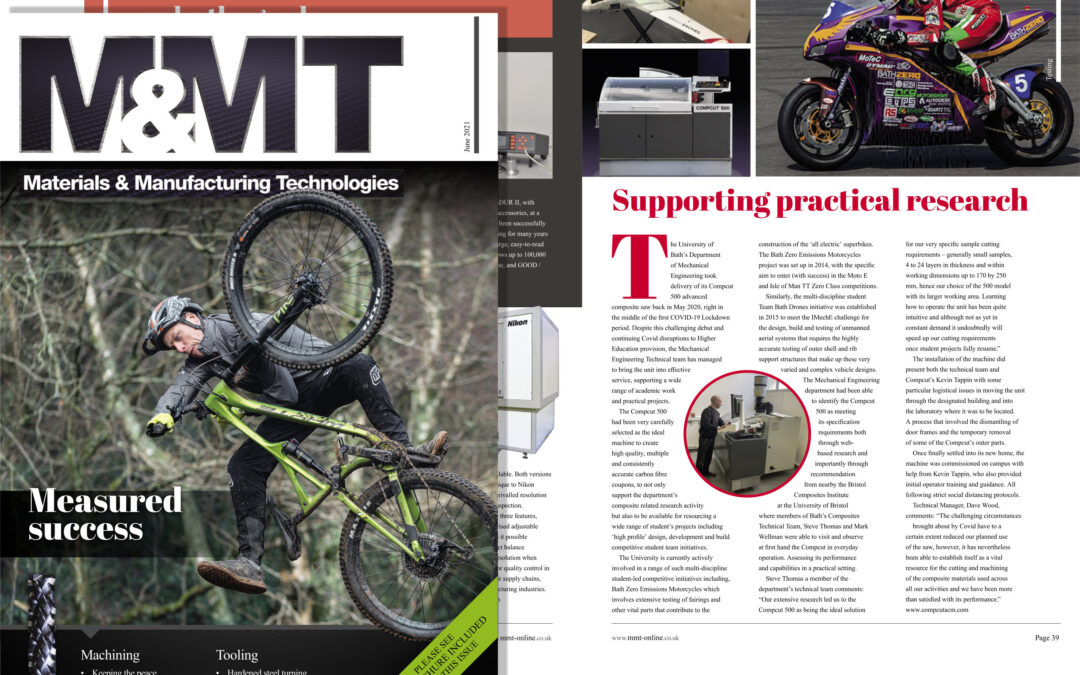The University of Bath’s Department of Mechanical Engineering took delivery of its Compcut 500 advanced composite saw back in May 2020, right in the middle of the first COVID-19 Lockdown period. Despite this challenging debut and continuing Covid disruptions to Higher Education provision, the Mechanical Engineering Technical team has managed to bring the unit into effective service, supporting a wide range of academic work and practical projects.
The Compcut 500 had been very carefully selected as the ideal machine to create high quality, multiple and consistently accurate carbon fibre coupons, to not only support the department’s composite related research activity but also to be available for resourcing a wide range of student’s projects including ‘high profile’ design, development and build competitive student team initiatives.
The University is currently actively involved in a range of such multi-discipline student-led competitive initiatives including, Bath Zero Emissions Motorcycles which involves extensive testing of fairings and other vital parts that contribute to the construction of the ‘all electric’ superbikes. The Bath Zero Emissions Motorcycles project was set up in 2014, with the specific aim to enter (with success) in the Moto E and Isle of Man TT Zero Class competitions. Similarly, the multi-discipline student Team Bath Drones initiative was established in 2015 to meet the IMechE challenge for the design, build and testing of unmanned aerial systems that requires the highly accurate testing of outer shell and rib support structures that make up these very varied and complex vehicle designs.
The Mechanical Engineering department had been able to identify the Compcut 500 as meeting its specification requirements both through web-based research and importantly through recommendation from nearby the Bristol Composites Institute at the University of Bristol where members of Bath’s Composites Technical Team, Steve Thomas and Mark Wellman were able to visit and observe at first hand the Compcut in everyday operation. Assessing its performance and capabilities in a practical setting.
Steve Thomas a member of the department’s technical team comments: “Our extensive research led us to the Compcut 500 as being the ideal solution for our very specific sample cutting requirements – generally small samples, 4 to 24 layers in thickness and within working dimensions up to 170 by 250mm, hence our choice of the 500 model with its larger working area. Learning how to operate the unit has been quite intuitive and although not as yet in constant demand it undoubtedly will speed up our cutting requirements once student projects fully resume.”
The installation of the machine did present both the technical team and Compcut’s Kevin Tappin with some particular logistical issues in moving the unit through the designated building and into the laboratory where it was to be located. A process that involved the dismantling of door frames and the temporary removal of some of the Compcut’s outer parts. Once finally settled into its new home, the machine was commissioned on campus with help from Kevin Tappin, who also provided initial operator training and guidance. All following strict social distancing protocols.
Technical Manager, Dave Wood, comments: “The challenging circumstances brought about by Covid have to a certain extent reduced our planned use of the saw, however, it has nevertheless been able to establish itself as a vital resource for the cutting and machining of the composite materials used across all our activities and we have been more than satisfied with its performance.”

